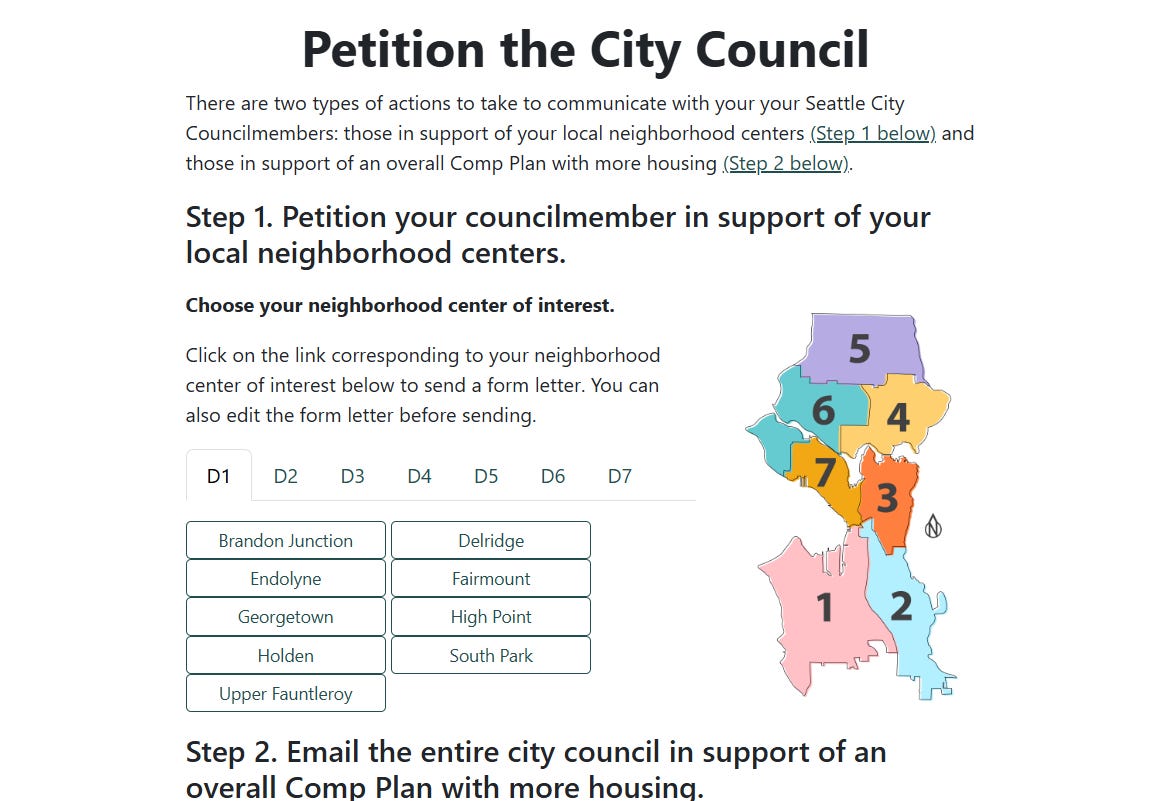Action Alert: Save Seattle's Neighborhood Centers
Pro-Housing Activists Push Back
Short version: push back on the NIMBY anti-housing petitions that threaten plans for our “neighborhood centers” here.
Find your neighborhood or other neighborhoods where appropriate, and please sign your name. It takes just a few seconds to sign. Then share with friends and family!
Harrell Enfeebled The Housing Plan
You may recall that last year, the professional planners at the city outlined a 20 year growth plan that would actually accommodate the expected demand for housing in Seattle, and thus have a moderating effect on prices. One aspect of this was a series of “neighborhood centers” around the city—very small commercial main streets with apartments.
But before the plan could be released, Bruce Harrell demanded it be turned into a characteristically feeble version instead, killing our chance at rising to the challenge.
This is because when it comes to housing, Harrell seems to prefer the expensive status quo, which pushes the middle class to the exurbs and ever more poor onto the streets. I suppose that given his twelve years on the council and three years as a Mayor actively creating that status quo, I shouldn’t be surprised. And yet, I continue to be genuinely perplexed by his clueless indifference to the reality faced by most people.
You may also recall that it appeared that, in this process, he exempted his own neighborhood from having a neighborhood center with more apartments. Not a good look for a politician with mounting scandals and a history of something dangerously close to self-dealing.
Save Our Neighborhood Centers
After an extremely broad coalition of organizations across the left, right and center quietly pushed the Mayor for months, they managed to cajole him into some small steps in the right direction. He had cut half the neighborhood centers, for instance, but restored a few.
While I guess I am pleased to see a few more neighborhood centers, it’s very little improvement. The city’s planners proposed 50 of these pocket main streets, and studied 46 in their environmental review. But the Mayor killed roughly half of what remained, seemingly aiming to lock apartments and small scale retail out of mostly wealthier neighborhoods, including his own. After a lot of pushing from the community, Harrell increased the number by just five (to 29), and I’ve seen no indication that their footprints will expand.
Now we have a new problem.
The NIMBYs are pushing back.1
True, the polls show they are very much in the minority in this city. But as you may recall, their capacity to cow centrist councilmembers is legendary. So much so that their vetocracy has given rise to a cottage industry of discussions about the failures of blue state governance to deliver on the ambitions of working families.
We shouldn’t have to both, after the thousands of comments and ten thousands “upvotes” in the previous round of environmental impact studies. But here we are. Some people on the council seem to be pretending than none of this painstaking, transparent, years-long process is real and this is the first anyone has heard of the comp plan. And they seem set to pander to the NIMBYs.
So, we have to stop that. The first step is signing the petition for neighborhoods near you, and any neighborhood you have a stake in.
(Next week there will also be a rally at City Hall at 4pm on February 5th, with the opportunity to testify before council at 5pm. Mark your calendars. More to come!)
Yes, I know some of my readers hate it when I say “NIMBY,” and think this is an unfair moniker. But almost all of these petitions are from people demanding that their neighborhood be exempted, and almost all of them are full of uninformed claims about the environment, water management, and affordability that are ubiquitous in the NIMBYsphere. They are literally petitions from people saying “NOT IN MY BACKYARD.”
So, I’ll have to beg your pardon at this word.
There are a few of you I know who have principled objections related to say, trees, that are also actively working on ways to make it so the zero-sum setup we have in Seattle regarding housing and trees is a thing of the past. I have respect for you and that.
But what I do not have respect for is the “I have a disgust response to apartments in my neighborhood” reflex followed by the willingness to repeat whatever nonsense to try to prevent those from going in, including the cynical use of equity and environment in pursuit of a policy that is inequitable for its exclusionary effects and terrible for the environment because of its impact on sprawl. You’ll note that the richest neighborhoods needed only a few days to generate large groups of signatories—this is no coincidence.


